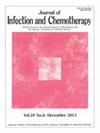Efficacy and validity of oral switch therapy from intravenous antibiotics in the treatment of urosepsis: A propensity matching score analysis at a single center
IF 1.5
4区 医学
Q3 INFECTIOUS DISEASES
引用次数: 0
Abstract
Introduction
Urosepsis is still a critical condition originating from a urinary tract infection. Although physicians often try to switch oral antibiotics from IV, there was no evidence to support switching to oral in the treatment of urosepsis.
Patients and methods
We retrospectively reviewed all patents with urosepsis to evaluate whether switching antibiotic therapy from IV to oral is as effective as IV antibiotic therapy during 2020–2022. Also, poor prognostic factor for 30- and in-hospital death were analyzed. Based on the antibiotic treatment, patients were divided into a switch and IV groups. Propensity-score matching (PSM) was used to balance the potential confounders, and 63 patients were selected in each group.
Results
A total of 208 patients were enrolled in the study. Sixty-seven patients were treated by switch therapy (switch group), while 101 patients were treated by IV therapy (IV group). After PSM, 63 patients were selected from each group, and the baseline characteristics were well-balanced. There were no differences in 7-, 30-day mortality, duration of hospital stay or antibiotic treatments between them. We analyzed poor prognostic factor for 30-and in-hospital death among them. The CCI score (≥3) was independent poor prognostic factor for 30-day death, and higher CCI score and higher SOFA score (≥4) were independent poor prognostic factor for in-hospital death.
Conclusion
Switching from IV to oral antibiotics is safe and effective in the treatment of urosepsis, contributing to shortening the duration of admission.
从静脉注射抗生素转向口服治疗尿毒症的疗效和有效性:单中心倾向匹配评分分析
尿脓毒症仍然是一种由尿路感染引起的危重疾病。虽然医生经常尝试将静脉注射抗生素改为口服抗生素,但没有证据支持在治疗尿脓毒症时改用口服抗生素。患者和方法我们回顾性回顾了所有尿脓毒症的专利,以评估在2020-2022年期间,将抗生素治疗从静脉注射转为口服抗生素治疗是否与静脉注射抗生素治疗一样有效。此外,还分析了院内死亡的不良预后因素。根据抗生素治疗情况,将患者分为切换组和静脉注射组。采用倾向评分匹配法(PSM)平衡潜在混杂因素,每组63例。结果共纳入208例患者。其中切换治疗67例(切换组),静脉治疗101例(IV组)。PSM后,每组各选择63例患者,基线特征平衡良好。他们在7天、30天死亡率、住院时间或抗生素治疗方面没有差异。我们分析了其中30例和院内死亡的预后不良因素。CCI评分(≥3)为30天死亡的独立不良因素,较高的CCI评分和较高的SOFA评分(≥4)为院内死亡的独立不良因素。结论由静脉给药改为口服抗生素治疗尿脓毒症安全有效,有助于缩短住院时间。
本文章由计算机程序翻译,如有差异,请以英文原文为准。
求助全文
约1分钟内获得全文
求助全文
来源期刊

Journal of Infection and Chemotherapy
INFECTIOUS DISEASES-PHARMACOLOGY & PHARMACY
CiteScore
4.10
自引率
4.50%
发文量
303
审稿时长
47 days
期刊介绍:
The Journal of Infection and Chemotherapy (JIC) — official journal of the Japanese Society of Chemotherapy and The Japanese Association for Infectious Diseases — welcomes original papers, laboratory or clinical, as well as case reports, notes, committee reports, surveillance and guidelines from all parts of the world on all aspects of chemotherapy, covering the pathogenesis, diagnosis, treatment, and control of infection, including treatment with anticancer drugs. Experimental studies on animal models and pharmacokinetics, and reports on epidemiology and clinical trials are particularly welcome.
 求助内容:
求助内容: 应助结果提醒方式:
应助结果提醒方式:


